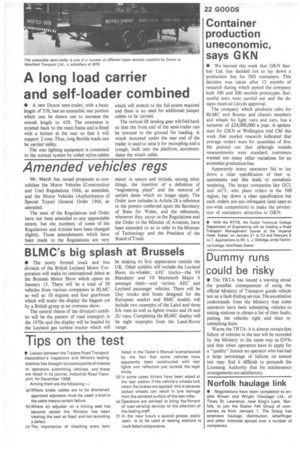Tips on the test
Page 24

If you've noticed an error in this article please click here to report it so we can fix it.
• Liaison between the Traders Road Transport Association's inspectors and Ministry testing stations has brought out some points of interest to operators submitting vehicles, and these are listed in its journal, Industrial Road Transport, for December 1968.
Among them are the following:—
(a) Where brake cables are to be shortened, approved adjusters must be used: a knot in the cable means certain failure.
(b)Where an adjuster on a driving seat has become seized the Ministry has been treating the seat as fixed, and not recording a defect.
(c) The importance of checking every item listed in the Tester's Manual is emphasized by the fact that some vehicles have apparently been constructed with rear lights and reflectors just outside the legal limits.
In some cases drivers have been asked at the test station if the vehicle's wheels lock when the brakes are applied: this is because locked wheels can result in tyre damage from the serrated surface of the test roller. Operators are advised to bring the fitment of load-sensing devices to the attention of the testing staff.
In the near future a special grease, easily seen, is to be used at testing stations to markfailed components.




























































































